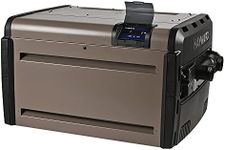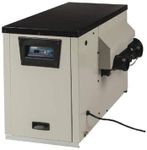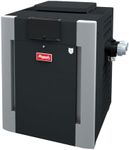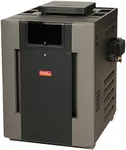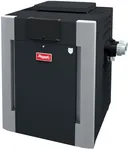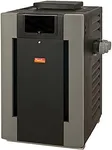Buying Guide for the Best Natural Gas Pool Heaters
Choosing the right natural gas pool heater can significantly enhance your swimming experience by maintaining a comfortable water temperature. To make an informed decision, it's important to understand the key specifications and how they align with your needs. Here are the main factors to consider when selecting a natural gas pool heater.BTU OutputBTU (British Thermal Unit) output measures the heating capacity of the pool heater. This spec is crucial because it determines how quickly and efficiently the heater can warm up your pool. Higher BTU ratings mean faster heating times. For small pools or spas, a heater with a lower BTU output (100,000-200,000 BTUs) may suffice. Medium-sized pools typically require 200,000-300,000 BTUs, while large pools may need 300,000 BTUs or more. Consider the size of your pool and how quickly you want it heated when choosing the BTU output.
EfficiencyEfficiency is expressed as a percentage and indicates how well the heater converts gas into heat. Higher efficiency means more heat is produced with less gas, saving you money on fuel costs. Standard efficiency heaters range from 80-85%, while high-efficiency models can exceed 90%. If you use your pool frequently or for extended periods, investing in a high-efficiency heater can be more cost-effective in the long run.
Size and InstallationThe physical size of the heater and its installation requirements are important to consider. Ensure you have enough space to accommodate the heater and that it can be installed in a location that meets safety and ventilation requirements. Some heaters are designed for indoor installation, while others are for outdoor use. Choose a model that fits your available space and installation preferences.
Control FeaturesModern pool heaters come with various control features, such as digital displays, programmable timers, and remote control options. These features can enhance convenience and allow you to maintain precise control over your pool's temperature. If you prefer easy and flexible operation, look for heaters with advanced control features. However, if you prefer simplicity, a basic model with manual controls may be sufficient.
Durability and MaterialsThe durability of a pool heater is influenced by the materials used in its construction. Heaters made with high-quality, corrosion-resistant materials like cupro-nickel or stainless steel tend to last longer, especially in harsh environments or saltwater pools. Consider the climate and water conditions in your area when selecting a heater, and opt for a model that offers robust construction and a good warranty.
Noise LevelThe noise level of a pool heater can impact your overall poolside experience. Some heaters operate more quietly than others, which can be important if you value a peaceful environment. Check the manufacturer's specifications for noise levels, and if possible, read user reviews to get an idea of how loud the heater is during operation. Choose a model that aligns with your preference for noise levels.
